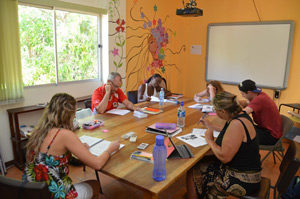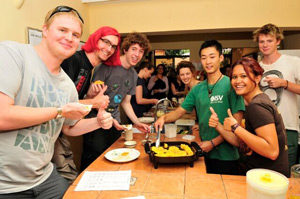
Duration: minimum one week
Minimum age: 18 years
Price: from $420 in combination with other programs
Weekly hours: 20 hours, 50 minutes/h. from Monday to Friday
Group size: average 2-6 participants, max. 6
Lesson schedule: In the morning from 09:00-13:00 o’clock
Extras: Many free cultural activities such as dancing and cooking classes.
Accommodation: In host families with half board.
Apply now
The language school is located in downtown Heredia – only 10 km from the capital San José – and is characterized by a complex of three picturesque colonial buildings with courtyards and a tropical oasis. The facilities offer a pleasant working atmosphere with open classrooms, a green garden and courtyards.
Heredia is a small town with colonial charm. The urban flair of the typical Latin American city goes hand in hand with excursion possibilities and a varied leisure program.
Nearby are swimming pools, gyms, sports facilities, theatres, bars and discos so you can enjoy your stay as you please.
 Free-time activities
Free-time activitiesIn addition to the actual language classes, the school also offers an Intercambio or Tandem program, where you can directly exchange ideas with locals and deepen your knowledge of Spanish. There will also be dance, cooking and yoga courses, educational excursions as well as bar and restaurant visits.
You will stay with a carefully selected Costa Rican host family. Here breakfast, dinner, private room and laundry service are included in the price, at the same time you have the possibility to get to know the life of the Ticos very close and to share their everyday life.
Please, fill out the online registration form, click on „Apply now“ in the upper right corner. So we have all your information at a glance. We will work out an individual program for you by e-mail and/or telephone. If everything fits and the program meets your expectations, we will send you your contract. As soon as we receive the signed contract back, your registration is legally binding.
Then we will send you the confirmation of admission.
Here you can find a general packing list. Depending on which projects you are driving, our local staff will send you more detailed information.
Luggage
Important!!! As a volunteer you are partly on rough terrain and should definitely travel with a BACKPACK. This makes travelling much more pleasant for you.
A shoulder bag or a smaller backpack
clothing
light summer clothes
short and long-sleeved T-shirts
long trousers made of linen or light fabric (to protect against mosquitoes on trips to the beach)
swimwear and beach towel
thin sleeping bag or bed sheet, if necessary
closed shoes, leisure / sneakers, sandals or flip flops
For protection
sunglasses
Headgear (shield cap, cloth or hat, simply to prevent „sunstroke“)
insect screen
thin rain jacket and small umbrella (peck)
Cosmetic
shower gel
other hygiene articles such as deodorants, etc. (in Costa Rica cosmetic products are generally more expensive than in Europe)
Sun protection agent (min. sun protection factor 30)
Insect repellent products (Costa Rican products are more effective than Autan)
We advise girls to bring tampons! (They are rather unusual here and very expensive)
We are happy to organize a language course according to your wishes.
Full-time courses can be taken at the beginning of program (usually Monday to Friday four hours in the morning). A language course is a great opportunity,
If you have any questions or would like to think about a language course, feel free to contact us so we can talk about the possibilities and your ideas.
Foreign health insurance
For your stay you need an international health insurance. We recommend that you take out Dr.Walter insurance (www.dr-walter.com/portale/auslandskrankenschutz.html). This insurance also offers travel cancellation/termination insurance for student exchanges and volunteers.
The costs amount to approx. 30 Euro per month and offer you all-round protection.
The insurance period is flexibly selectable between 2 and 24 months.
A foreign health insurance LANGZEIT is sufficient and you are insured worldwide.
There are many telephone providers in Costa Rica, although we recommend KÖLBI, a subsidiary of the national electricity company of the country ICE (Instituto Costarricense de Electricidad), due to its good nationwide reception network. A SIM card with internet access (about 2 US$/1000 Colon) will be purchased together with you upon arrival in San Jose. It is best to use an old mobile phone with Whatapp applications.
For direct entry to Costa Rica from USA and European countries, no vaccinations are required. However, it is recommended standard vaccinations such as tetanus, diphtheria, measles, mumps, rubella and influenza, as well as yellow fever, rabies, typhoid fever, hepatitis A and, for long-term stays, hepatitis B as travel vaccinations.
Doctors and treatment costs
The costs for medical treatment and medication must first be paid on site in cash (possibly also by credit card). Anschlieβend you can submit the bills to your insurance company in Germany for reimbursement. When choosing your health insurance abroad, you should make sure that it provides a return transport in an emergency with einschlieβt.
Dengue fever
Dengue is transmitted by mosquitoes during the rainy season, mainly on the Caribbean coast and in the Pacific region of Guanacaste. The disease is usually accompanied by fever, skin rash and severe pain in the limbs. In the case of native children, severe complications can occur, but this is rarely the case for travellers (or for the first infection). A vaccination does not yet exist, so always think of appropriate mosquito protection.
Malaria & yellow fever
The risk of contracting the tropical diseases malaria and yellow fever in Costa Rica is very low. As a rule, these only occur in the South American countries from Colombia.
Tuberculin test and tuberculosis
Participants in the animal project must first complete a so-called tuberculin test in order to be able to discard a previous or current tuberculosis disease. It is best if you complete the test before you leave country, but there is also the possibility that a CAS Team member will accompany you to the doctor in Costa Rica. Overall, the risk of tuberculosis infection in Costa Rica is now very low. Last year only 11 cases per 100,000 inhabitants were diagnosed.
Due to the mosquito-borne infection risks, you should also
Many banks charge fees, so it is only worth withdrawing higher amounts. VISA, Mastercard or american express cards are also well accepted in the whole country and you can withdraw money in the ATMs or national Banks.
Important!
In general, you should leave valuables at home and only take as much cash with you as you really need. Unfortunately, there is also the risk of being attacked during the day, especially as a foreigner. Of course you can protect yourself by not being alone in the dark and not being in areas known for their high crime rate. We also advise against wearing eye-catching jewellery or branded clothing! Should it nevertheless come to a robbery with or without weapon – do not play the hero! Even if it may look like an attacker is alone, most thieves have accomplices waiting at the next corner. Always remember that your health has priority.
The national currency in Costa Rica is the Colon (Pl.Colones). There are coins up to a value of 500 and notes worth 1000, 2000, 5000, 10000, 20000 and 50000 Colones. In general, small amounts like a bus ride or an ice cream can be paid with small change or small bills, as street vendors often don’t have much change. In bigger supermarkets, however, you can also get rid of the big bills. The current status (July 2017) is 570 colones for one dollar and 650 colones for one euro.
Especially in the tourist places, dollars are often accepted, but the change may be given in colones. In general you should not rely on paying in dollars in San José in particular. We therefore recommend that you bring cash in dollars with you, but exchange it as soon as possible or withdraw colones in your first few days.
Attention
Euro is usually not as easy to exchange as dollars!
For your program you would have to include the additional costs of
Plane ticket.
Foreign health insurance.
Pocket money (approx. $200 per month)
Prepaid Sim Card ($5)
Hostel stays during trips from project to project. A hostel costs between $10-$15 (the price is included on arrival and departure).
Travel costs to the projects. In Costa Rica there is a very well developed bus transport system with which you can use to get to the projects. Depending on the project you pay between 10 – 60 Dollars per route. A standard price for a long distance is about 10 Dollars. Sometimes the projects are not reachable by bus and you have to take a boat or a transport by taxi or a horse.
You can always call us if you have any questions or problems. We will give you our office number as well as our personal mobile phone numbers and a emergency number, which you can use to reach us 24 hours a day. Immediately after your arrival in Costa Rica, you will get an orientation about Costa Rica and detailed information about your program.
